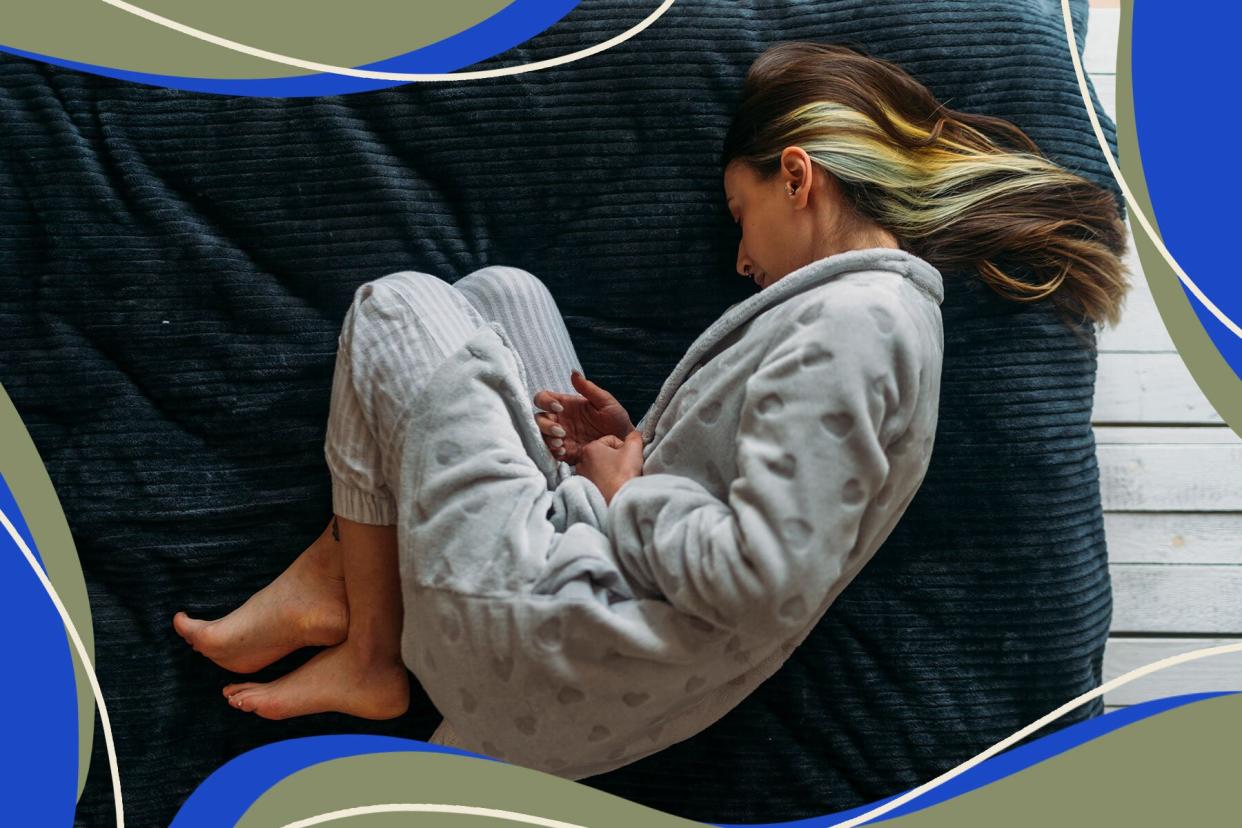4 Ways To Treat Period Cramps That Actually Work

Getty Images/InStyle
It's your time of the month again and you wake up in the fetal position wondering how you're going to make it through your jam-packed day with painful aches and cramps. We've all been there - and it can derail your day and mood.
The majority of women experience cramps before and during their flow, says New York-based ob-gyn and Midol partner, Alyssa Dweck, M.D. Quick lesson: Menstrual cramps, also known as dysmenorrhea, occur because of the release of molecules called prostaglandins, explains Nicole Williams, M.D., ob-gyn and founder of the Gynecology Institute of Chicago. "Prostaglandins cause the uterus to contract and release the tissue your body no longer needs," she explains. "This pain is usually worse at the beginning of the cycle, the first 1-2 days, when the uterus has to work hardest to get rid of the excess tissue."
The problem is, even if you grab the ibuprofen and heating pad as soon as period cramps come on, it might be too little too late to actually stop them. But lucky, there are a few ways you can treat cramps that are actually effective - and contribute to long-term relief.
Video: Here's Why You Might Be Experiencing More Intense Periods After Receiving Your Vaccine
RELATED: What Your Period Cramps Might Be Trying to Tell You
1. Pop an Advil Before Your Period Starts
First things first, Dr. Williams recommends being proactive and starting treatment before your cramps even hit. She suggests taking a 600 mg dose of an NSAID, like Ibuprofen, the day before your period starts.
"This way, we can more effectively combat the prostaglandins' crampy effect while not sacrificing the uterus' ability to get the tissue out," explains Dr. William. "I always tell my patients, it's hard to stop a train once it has left the station."
Dr. Dweck agrees the best way to tackle cramps is taking preemptive measures. But if you're unable to plan ahead or just forget, she suggests trying an over-the-counter medication, like Midol Complete ($7; amazon.com), which contains acetaminophen for pain relief from cramps, backaches, muscle aches and headaches, as well as caffeine and pyrilamine maleate to alleviate fatigue, water-weight gain, and bloating.
2. Hop on That Peloton - or Try Some Yoga
OK, we get that you probably do not feel like exercising when your cramps are so bad that you'd rather be in the fetal position on your bed. But both experts agree that regular exercise can work wonders against cramps for both short- and long-term relief. "Although it seems counterintuitive, exercise done regularly can help," says Dr. Dweck.
Why? "By increasing your blood flow, you increase endorphin production which can help with stress and cramp pain," Dr. Williams adds, explaining that cardio is especially effective in relieving symptoms.
But on the days where you can't imagine getting on that Peloton or going for a run, flowing into your favorite yoga poses can help with your, well, flow. Dr. Williams says upward dog, bridge, and bow pose specifically help with cramps. "These stretch the lower pelvis and may decrease some of the most severe contractions," she explains.
3. Cut Out Junk Foods
Sorry to break it to you, but it isn't just about what you eat during your period - what you put into your body all month long also matters. Dr. Williams explains that creating healthy eating habits - like cutting out sugary, processed foods - can be a long-term solution to your period woes because it will help reduce inflammation in the body, resulting in less severe cramps.
She also suggests adding in magnesium, like this Nature's Bounty tablet ($6; amazon.com) and an Omega-3 supplement, like Nordic Natural's soft gels ($35; amazon.com). Her favorite diet to try on your period (and otherwise)? "The Mediterranean diet [is] full of fish and healthy olive oil."
4. Have a Good Orgasm (with a Partner or Solo)
Whether you're with a partner or flying solo menstrubation style, orgasming may help to reduce period symptoms or pain. As we previously reported, it's all due to increased blood flow to the uterus and the release of feel-good chemicals, like oxytocin and dopamine. Vaginal penetration - whether that's with fingers, vibrator, or penis - can also increase your pain threshold.
Dr. Williams adds that another reason orgasming from solo or partner sex can help is because it relaxes your muscles. "A good orgasm, with its contraction and release of muscles, is always welcome in my book!" she says.
In fact, when sexual wellness company Womanizer and menstrual cup brand Lunette conducted a study together about the effects of masturbation on your period, they found that 43% of study participants said that medication was most effective in reducing cramps and almost the same number, 42%, said "menstrubation" was. Overall, 90% of participants said they'd recommend masturbating to combat period pains.
When Should I Seek Professional Help for Period Cramps?
Experiencing uncomfortable, or even sometimes painful, symptoms and cramps during your period is normal, but there are a few telltale signs you should drop the Ibuprofen and go see your doctor.
"Any persistent, worsening, or unpredictable cramps or those that don't resolve with [your] flow should be checked," advises Dr. Dweck. Meaning, if your cramps continue or worsen throughout your cycle or after the first few days of your period, this could be some cause for concern and you should see your doctor.
Dr. Dweck and Dr. Williams add that severe pain on your period could be a sign of another underlying issue, like endometriosis. "This sometimes debilitating condition is a result of the tissue in the uterus getting out into the pelvis, which can cause very severe cramping, and even pain outside of menstruation," she says. Bottom line: "If your cramps are not helped with these other measures, it is best to seek the help of a pro."

